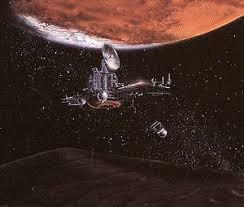Space is nothing about the future - making the dreams happen, turning the hopes into reality, and who knows what it will bring? Samples from Mars, we can but hope
Not everyone has a scientific background, nor could some care less about science. At least with space they can look at pretty pictures which is why it is popular.
Polar exploration has always fascinated me for that very reason. As an aside, Gene Roddenberry based Star Trek on explorers at sea. And if he had made a series about that, I would have watched that.
The end result was a Langley team managed the Viking missions, not least the landers whose purpose was to look for life on Mars. Here are some fabulous ideas of what Martian life might look like circa 1975.
So the idea of an ancient civilization on Mars fed into the popular culture – despite the fact only a handful of linear markings were ever seen on the planet and even then were disputed
So yes - from old Perc to Percy, you might say. Rather than tell the story of Lowell – which we do in our @search_mars book – take a look at the fabulous Lowell Archive @asignalfrommars from where the following photos are taken
The best book written by an astronaut? Hands down "Carrying The Fire" by @AstroMCollins and other great books on Apollo by @ChasingMoonBk @drdwhitehouse and the one by Murray and Cox
Beyond this mission, China is planning on returning samples from Mars about the same time as the joint ESA/NASA attempts in 2030 or so
@search_mars @howellspace @Thievesbook So yes, the first book I ever worked on was about Mars - and the reason? Because the Soviet Union was launching two missions in the summer of 1988 to orbit and make landings on Phobos, the larger Martian moon
The Hope mission will generate a “synoptic” view of Mars, a weather satellite for the Red Planet, its orbit chosen so that it can fit in gaps between existing orbiters and their instruments































